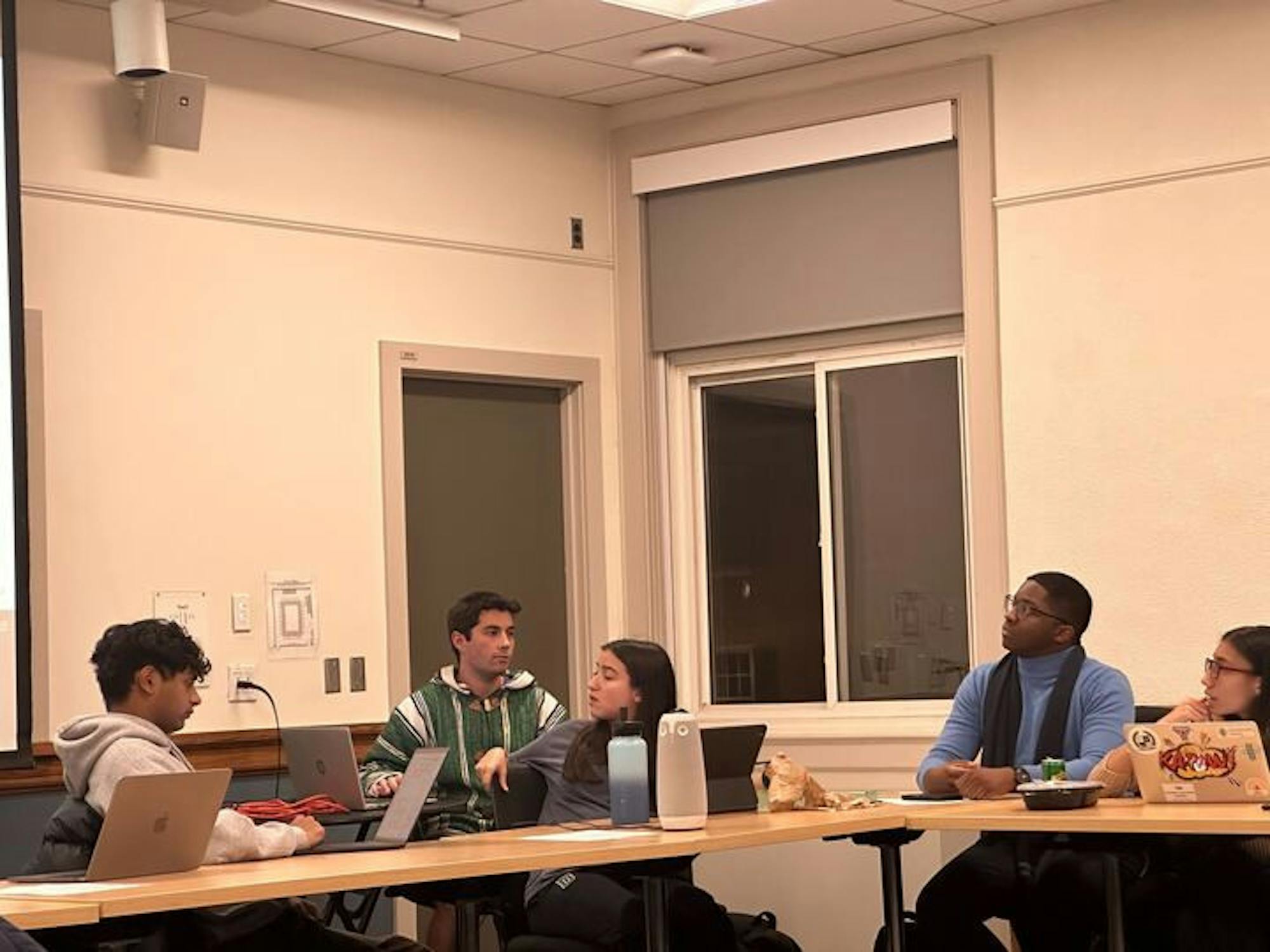On Jan. 28, the Dartmouth Student Government Senate met for its third weekly meeting of the winter term. Led by student body president Jessica Chiriboga ’24, the Senate discussed amending Senate membership policy and providing non-alcoholic drinks to Greek houses.
School House Senator JJ Dega ’26 requested a vote to provide $1000 to help the Student Wellness Center provide non-alcoholic beverages to Greek spaces during Winter Carnival as part of its Polar Project — in which polar seltzers are provided to Greek houses. The SWC is looking into a partnership with Liquid Death, a canned water company, Dega said.
Chiriboga highlighted that the “trendy” branding of Liquid Death could help normalize drinking water while at Greek houses, which is especially important because “part of the Polar Project is to reduce the stigma about having a non-alcoholic drink.”
The proposition to provide $1000 passed with a vote of 11-0-0.
DSG-Hanover town liaison Nicolás Macri ’24 also led discussion about amending the DSG Constitution to make whom certain sections refer to more specifc. His proposed amendments to Article I specified that only senators and representatives were members of DSG, and that “students” referred to “Dartmouth students,” and were approved with a vote of 12-0-0.
The Senate then discussed increasing the size of the Senate by adding two at-large senator positions for each class year, regardless of housing community, bringing the total number of senators per class to eight.
“We technically have 24 members but never actually do [because] some are [on off-terms and] the East Wheelock seat [for the Class of 2024] still isn’t filled,” Macri said.
According to the DSG website, a student who has attended three Student Government meetings in a term is eligible to be appointed as a representative by the Senate. Representatives are non-voting members of the DSG but share all other powers granted to senators.
Macri added that the expansion would make the Senate more inclusive to students from the same housing community who might have similarly good ideas and commitment.
“This proposal is to allow for people from the same housing community to serve in a full capacity, while still keeping that connection to our communities,” he explained.
Allen House Senator Ikenna Nwafor ’27 asked why at-large representatives in the current system were not a satisfactory way for students to become involved in Senate projects. Macri responded that it was because representatives “only exist at the discretion of the Senate” and that “in the past, the Senate has chosen not to admit representatives.” As a result, those who serve as representatives may not feel as comfortable speaking candidly, he said.
School House Senator Ian McKenna ’27 suggested that, rather than creating two new at-large positions per class, the two houses with the “most popular senators” should have two senators instead of one.
The language of the amendment also specifies that senators must be in residence for two to four terms during an academic year to be eligible for the position, and that representatives are non-voting members who must renew their position by attending at least three DSG meetings per term.
The Senate decided to table the discussion and voting on the proposed amendment.
Members then discussed a separate amendment to ban votes from occurring “in secret” during closed sessions. Student body vice president Kiara Ortiz ’24 was concerned that the language of the amendment would prevent private conversations among Senators during group meetings.
“If there is confidential information that we are not allowed to discuss with the public, I feel we should be able to discuss it and go forward with a report that we voted to the student body and then share that information,” she said.
The Senate then modified the language of the amendment to allow votes to occur in secret but require that the vote totals be announced publicly.
The amendment passed with a vote of 11-0-2.
DSG Senate meetings occur weekly on Sundays at 7 p.m. in Collis 101 and are open to all students.
Correction appended (Feb. 15): A prior version of this article misstated the vote count (11-0-2 rather than 10-0-2) and the quote regarding the "same" housing community.
Correction Appended (May 24, 3:33 p.m.): A previous version of this article stated that the amendment passed but did not mention that it had been amended to reflect Ortiz's concerns prior to passage. The article has been updated.




